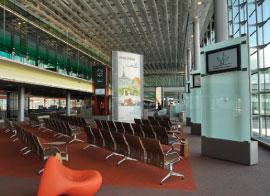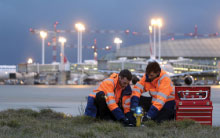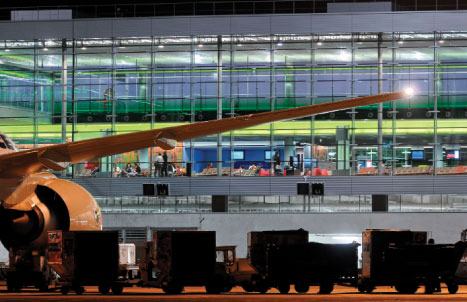
François Rubichon, Deputy CEO, AdP: “Our passengers will be offered new travel opportunities on destinations served by only one platform and increased frequencies on common destinations.”
As airport competition has increased with the effects of the liberalisation of traffic rights by the EU over the last 10 years, there is now a growing adoption of this trend appearing in other continents. Furthermore, the intensifying confrontation between medium and large hubs in Europe is now happening against a backdrop of emerging super-hubs in the Gulf and elsewhere in the world. Airports’ customer base is also undergoing a metamorphosis as airline consolidation continues and the risk of the dominance by certain airline groups becomes a serious possibility. In the face of such dramatic changes, AdP and Schiphol Group are partnering to boost their respective market positions. It is an innovative and surprising move that mirrors the tendency of airlines to consolidate into strong international alliances. The establishment of the alliance is expected to be completed by end-2008; the industrial cooperation will then come into force for an initial period of 12 years, with regular reviews to determine whether the parameters should be enlarged further.

Ad Rutten, Executive Vice President and COO, Schiphol Group, explained that the alliance will “give AdP and Schiphol Group the edge over other airports and creates a leading network of connections for European and worldwide transfer travellers”.
Harmonised processes
The combined catchment areas will create a passenger market with 59 million inhabitants. “Our passengers will be offered new travel opportunities on destinations served by only one platform and increased frequencies on common destinations. Harmonisation of processes and products offered on both platforms will align customer experience so that it becomes no different for a passenger to connect in Schiphol for the outward journey and through Paris-Charles de Gaulle for the round trip,” said Rubichon.
By sharing their respective best practices, improving the competitiveness of both platforms and developing collaborative approaches, Schiphol Group and AdP also expect to strengthen their relationship with their largest clients including, of course, Air France-KLM. “We expect the cooperation to strengthen our relationship and integration with our largest clients through optimised connectivity between the two airports,” said Rutten.
Governance structure
AdP and Schiphol Group have established a balanced governance structure through mutual representation on their respective boards. Schiphol Group’s CEO Gerlach Cerfontaine and CFO Pieter Verboom will be appointed on the Aéroports de Paris board, while Pierre Graff, CEO of Aéroports de Paris, will be appointed on the supervisory board of Schiphol Group.

“Harmonisation of processes and products offered on both platforms will align customer experience so that it becomes no different for a passenger to connect in Schiphol for the outward journey and through Paris-Charles de Gaulle for the round trip,” said Rubichon.
“On top of the traditional governance, we have decided to set up a dedicated organisation to successfully implement the industrial cooperation. An Industrial Cooperation Committee (ICC) will be created with an equal number of members from Aéroports de Paris and Schiphol. This committee will steer the implementation of the industrial cooperation and will ensure that we deliver the expected results according to the initial plans,” explained Rubichon. The ICC will be supplemented by eight business steering committees that will monitor the progress of cooperation projects on a daily basis: dual hub and network attractiveness, airport operations, retail, international development, real estate, telecom and IT, sustainable development and purchasing. “In those eight areas, our teams have mutually identified, quantified and prioritised a set of 60 initiatives,” said Rubichon.
The first meetings of the ICC and eight steering committees were recently held in Amsterdam and the first wave of 30 initiatives related to the implementation and operational management of the cooperation has been launched. The 30 initiative leaders have been appointed; they will collaborate on the first set of initiatives, which will be launched in Q1 2009.

Capital expenditure will see an estimated saving of 718 million per year from 2013 onwards – by pooling the volume of tangible goods such as security systems, air bridges and IT systems, while at the same time jointly redesigning specifications to increase commonality of products and limit complexity.
Financial efficiencies
Capital expenditure will see an estimated saving of €18 million per year from 2013 onwards – this will mainly be achieved by pooling the volume of tangible goods such as security systems, air bridges and IT systems, while at the same time jointly redesigning specifications to increase commonality of products and limit complexity.
There are also plans to leverage competitive advantage to accelerate growth, profitability and time-to-market of innovative products and services in retail, real estate and telecoms. “In retail, as an example, Schiphol Group will benefit from our winning concept in fashion and from our concession contracting know-how. In return, Aéroports de Paris will benefit from Schiphol sales monitoring processes and IT systems and will save development efforts and investments,” said Rubichon.
Rutten added that both partners will cooperate to develop more attractive retail areas and customer experience and explore the possibility of generating synergies by combining their purchasing volumes in direct retail.

The dual-hub concept is to create a unique highly connected airport system, which will allow AdP and Schiphol Group to take advantage of two large catchment areas, creating a passenger market with 59 million inhabitants.
The dual-hub concept aims at creating a unique, highly connected airport system. By entering into this innovative alliance AdP and Schiphol Group are proactively working to anticipate future challenges in the aviation industry and many in the airport sector will be keenly observing the alliance’s progress to see if this new cooperation yields the mutual benefits expected. Ultimately, the key benefit will be the improved competitiveness of both airport groups, while the harmonised processes will undoubtedly improve the passenger experience and strengthen relationships with their largest clients – including Air France-KLM.
Air France-KLM statement:
Air France and KLM welcome the cooperation between Amsterdam Airport Schiphol and Aéroports de Paris. In these challenging economic times, it is essential to operate as efficiently as possible. The future of the European airline industry lies in cooperation across borders, not only in the air, but also on the ground.
Air France and KLM already operate on the basis of an integrated network philosophy and of a dual-hub strategy. If airports also synchronise their processes, our passengers and cargo shippers will benefit at the very most. For example, streamlined handling processes, one-stop security, exchange of knowledge, etc.







